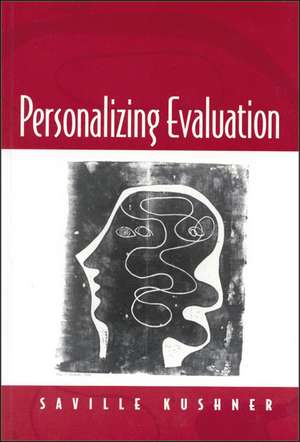Personalizing Evaluation
Autor Saville Ian Kushneren Limba Engleză Paperback – 7 mar 2000
`This book makes an important and unique contribution to evaluation' - Michael Quinn Patton, The Union Institute, Minneapolis
Personalizing Evaluation challenges the mainstream approach to program evaluation by inverting the traditional relationship between program and person. Saville Kushner shows how evaluation should document individual and group experience and use this as a lens through which to read social programs and to measure their significance in people's lives. He uses a wealth of examples and case studies to illustrate how a deeper understanding of program evaluation can be achieved across a range of issues and applications.
The book addresses three principal concerns that are at the heart of the evaluation process: how to learn about evaluation in ways which are related to the often confusing and messy experience of doing it; how to understand the role of evaluation as a form of personal expression and, even, political action; and how to use evaluation to say something about people's lives as well as about the programs and institutions people are involved in.
Preț: 423.98 lei
Preț vechi: 498.80 lei
-15% Nou
Puncte Express: 636
Preț estimativ în valută:
81.15€ • 83.63$ • 68.51£
81.15€ • 83.63$ • 68.51£
Carte tipărită la comandă
Livrare economică 03-17 martie
Preluare comenzi: 021 569.72.76
Specificații
ISBN-13: 9780761963622
ISBN-10: 0761963626
Pagini: 240
Dimensiuni: 156 x 234 x 13 mm
Greutate: 0.36 kg
Ediția:First Edition
Editura: SAGE Publications
Colecția Sage Publications Ltd
Locul publicării:London, United Kingdom
ISBN-10: 0761963626
Pagini: 240
Dimensiuni: 156 x 234 x 13 mm
Greutate: 0.36 kg
Ediția:First Edition
Editura: SAGE Publications
Colecția Sage Publications Ltd
Locul publicării:London, United Kingdom
Recenzii
`A brilliant piece of work, adroitly fitted to the present state of affairs in program evaluation, devoted to a defensible and under-attended proposition - that we should understand programs through their recipients' - Robert Stake, University of Illinois, Urbana-Champaign
`This book makes an important and unique contribution to evaluation' - Michael Quinn Patton, The Union Institute, Minneapolis
`In the latest posting from Saville Kushner, he makes reference to "democratic evaluation" and to the importance of evaluators as critics of those in power. There are nuances to his posting that may escape those not familiar with the perspective Kushner and colleagues bring to evaluation. Until now, there has been no easy access to that perspective, especially for American evaluators. Now there is.
Saville Kushner has just published a very important book, "Personalizing Evaluation" (SAGE Publications, 2000). His focus is on the experiences of people in programs as a lens for understanding a program. This isn't new. How he does it-and his commitment to keeping that perspective at the center of evaluation-will, I suspect, be new for many. This is the clearest and deepest articulation of "democratic evaluation" yet available to a wide audience, informed by the acute European sensitivity to Politics (big P) and politics (small p) -- and their intersection.
Much of evaluation these days (logic models, theories of action, outcomes evaluation) is driven by the need/desire to simplify and bring order to chaos. Saville embraces the chaos. He revels in messiness. He embraces complexities. In so doing, he eschews models, both evaluation models and program models, and stays focused on the experiences of real people struggling with real stuff in real settings. It is messy, difficult, complex, chaotic-and wonderful. He challenges the facile perspectives and bureaucratic imperatives that dominate much of current institutionally-based evaluation practice. Over and over he returns to the people, to the children and teachers and parents, and the realities of their lives in "program settings" as they experience those realities. He elevates their judgments over professional and external judgments. He calls this "personalizing evaluation." Many, I suspect, will see it as a radical approach. If so, it serves to expand our conception of what's possible.
The book is beautifully written, full of engaging stories. It is carefully crafted to reveal complexities and, to an unprecedented extent, Saville shares his own foibles and struggles. Where he is uncertain, he says so. He offers doubts and questions, as much as possibilities and perspectives. I don't resonate to all of what Saville advocates, but all of what he advocates challenges me to think anew about what I do and how I do it. This book forces you to get clear about your own evaluation practice and priorities.
That, at least, was my experience of the book. In keeping with the perspective Saville offers, I think it would be presumptuous and inappropriate for me, based on just my experience and preferences, to recommend the book. So I'll leave it at that, sharing my experience, and suggesting that, if Saville's Summerhill report here on EvalTalk has intrigued you, you'll find lots more good stories in this new book' - Michael Quinn Patton, The Union Institute, Minneapolis - message to EvalList
`This book makes an important and unique contribution to evaluation' - Michael Quinn Patton, The Union Institute, Minneapolis
`In the latest posting from Saville Kushner, he makes reference to "democratic evaluation" and to the importance of evaluators as critics of those in power. There are nuances to his posting that may escape those not familiar with the perspective Kushner and colleagues bring to evaluation. Until now, there has been no easy access to that perspective, especially for American evaluators. Now there is.
Saville Kushner has just published a very important book, "Personalizing Evaluation" (SAGE Publications, 2000). His focus is on the experiences of people in programs as a lens for understanding a program. This isn't new. How he does it-and his commitment to keeping that perspective at the center of evaluation-will, I suspect, be new for many. This is the clearest and deepest articulation of "democratic evaluation" yet available to a wide audience, informed by the acute European sensitivity to Politics (big P) and politics (small p) -- and their intersection.
Much of evaluation these days (logic models, theories of action, outcomes evaluation) is driven by the need/desire to simplify and bring order to chaos. Saville embraces the chaos. He revels in messiness. He embraces complexities. In so doing, he eschews models, both evaluation models and program models, and stays focused on the experiences of real people struggling with real stuff in real settings. It is messy, difficult, complex, chaotic-and wonderful. He challenges the facile perspectives and bureaucratic imperatives that dominate much of current institutionally-based evaluation practice. Over and over he returns to the people, to the children and teachers and parents, and the realities of their lives in "program settings" as they experience those realities. He elevates their judgments over professional and external judgments. He calls this "personalizing evaluation." Many, I suspect, will see it as a radical approach. If so, it serves to expand our conception of what's possible.
The book is beautifully written, full of engaging stories. It is carefully crafted to reveal complexities and, to an unprecedented extent, Saville shares his own foibles and struggles. Where he is uncertain, he says so. He offers doubts and questions, as much as possibilities and perspectives. I don't resonate to all of what Saville advocates, but all of what he advocates challenges me to think anew about what I do and how I do it. This book forces you to get clear about your own evaluation practice and priorities.
That, at least, was my experience of the book. In keeping with the perspective Saville offers, I think it would be presumptuous and inappropriate for me, based on just my experience and preferences, to recommend the book. So I'll leave it at that, sharing my experience, and suggesting that, if Saville's Summerhill report here on EvalTalk has intrigued you, you'll find lots more good stories in this new book' - Michael Quinn Patton, The Union Institute, Minneapolis - message to EvalList
Cuprins
Program Evaluation
The Heart of the Matter
Personalizing Program Evaluation
Love and Death and Program Evaluation
Evaluation and a Philosophy of Individualism
Knowing Me, Knowing You
Evaluation Interviewing
To Have and Have Not
Critical Distance and Emotional Proximity
Essences, Contexts and Transition
The Individual at the Margins of the Program
Ethics, Mortality and the Conduct of Evaluation
People in Change
Robert Campbell and Cultural Standards in Curriculum Evaluation
The Heart of the Matter
Personalizing Program Evaluation
Love and Death and Program Evaluation
Evaluation and a Philosophy of Individualism
Knowing Me, Knowing You
Evaluation Interviewing
To Have and Have Not
Critical Distance and Emotional Proximity
Essences, Contexts and Transition
The Individual at the Margins of the Program
Ethics, Mortality and the Conduct of Evaluation
People in Change
Robert Campbell and Cultural Standards in Curriculum Evaluation
Notă biografică
Descriere
Challenges the mainstream approach to program evaluation by inverting the traditional relationship between program and person, this book addresses three principal concerns: learning about evaluation in relation to the experience of doing it; understanding evaluation as a form of personal expression; and using evaluation to comment on people's lives.








